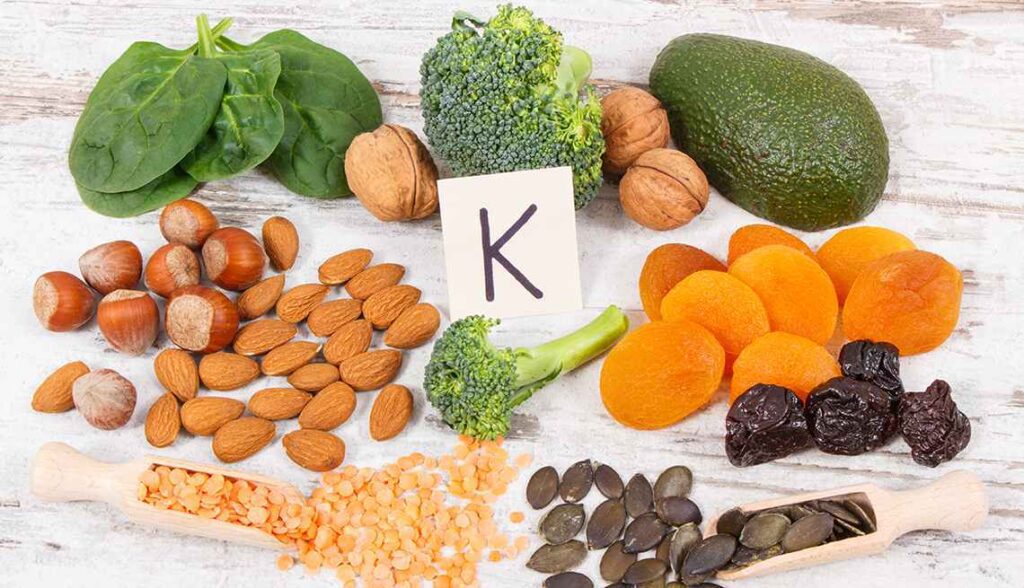Vitamin K, a fat-soluble vitamin, plays a crucial role in various bodily functions, primarily in blood clotting and bone metabolism. While often overshadowed by its more famous counterparts, Vitamin A, C, and D, understanding its importance is essential for maintaining good health.
Table of Contents
Structure and Types
VitaminK exists in two main forms:
Phylloquinone (K1)

Found in green leafy vegetables like spinach, kale, and collard greens, this form is readily absorbed by the body.
Menaquinone (K2)
Produced by gut bacteria and found in fermented foods like cheese and natto, this form is more stable and has a longer lifespan in the body.
Both forms have the same basic structure, characterized by a long, hydrophobic tail and a quinone ring, which is responsible for its biological activity.
Biological Roles
Blood Clotting: VitaminK’s most well-known function is its role in blood clotting. It acts as a cofactor for enzymes involved in the synthesis of proteins crucial for blood clotting, primarily prothrombin (factor II). These proteins form a complex network that helps stop bleeding by converting fibrinogen to fibrin, forming a clot.
Bone Health: VitaminK plays a vital role in bone health by assisting in the formation of osteocalcin, a protein that helps bind calcium to bone. This strengthens the bone matrix and improves bone mineral density.
Other Roles: VitaminK also plays a role in:
Cellular Growth and Development: It is essential for proper cell growth and development, particularly in the liver, kidneys, and brain.
Cardiovascular Health: Some research suggests it may play a role in reducing cardiovascular disease risk by influencing blood vessel function and blood pressure.
Deficiency
While VitaminK deficiency is rare in healthy individuals, certain factors can increase the risk:
Malabsorption: Conditions like celiac disease, Crohn’s disease, and cystic fibrosis can hinder the absorption of fat-soluble vitamins like VitaminK.
Medications: Certain medications, including antibiotics, blood thinners (warfarin), and anticonvulsants, can interfere with the body’s ability to produce or absorb VitaminK.
Dietary Deficiency: A diet lacking in leafy green vegetables and fermented foods can contribute to VitaminK deficiency.
Newborn Infants: Newborns have limited VitaminK reserves and are at a higher risk of deficiency. This can lead to a bleeding disorder called hemorrhagic disease of the newborn.
Symptoms of Deficiency
The most common symptom of VitaminK deficiency is easy bruising and bleeding. Other symptoms may include:
- Nosebleeds
- Heavy menstrual bleeding
- Bleeding in the gums
- Blood in the urine or stool
- Delayed wound healing
Diagnosis and Treatment
A doctor can diagnose Vitamin K deficiency through a simple blood test that measures the amount of prothrombin in the blood. Treatment usually involves taking Vitamin K supplements, either orally or intravenously, depending on the severity of the deficiency.
Recommended Intake
The recommended daily intake of Vitamin K varies by age and gender. Generally, adults need around 90 mcg for men and 90 mcg for women.
Foods Rich in Vitamin K

- Green Leafy Vegetables: Spinach, kale, collard greens, turnip greens, mustard greens, lettuce, parsley
- Cruciferous Vegetables: Broccoli, Brussels sprouts, cauliflower, cabbage
- Other Vegetables: Asparagus, avocado, green beans, peas
- Fruits: Kiwi, figs
- Meat: Liver
- Dairy: Fermented cheeses, yogurt
Conclusion
Vitamin K, often overlooked, plays a crucial role in maintaining blood clotting and bone health. While deficiency is relatively uncommon, understanding its functions and potential risks is essential for optimal health. By incorporating a balanced diet rich in leafy greens and fermented foods, and consulting with a healthcare professional when necessary, you can ensure you receive enough Vitamin K for a healthy and vibrant life. Vitamin K is a vital nutrient that supports several vital body processes, including blood coagulation and bone health. A healthy diet that includes plenty of fermented foods and leafy green vegetables should supply enough vitamin K.
Frequently Asked Questions(FAQ)
Define VitaminK?
Vitamin K is a vital nutrient that supports several vital body processes, including blood coagulation and bone health. A healthy diet that includes plenty of fermented foods and leafy green vegetables should supply enough vitamin K.
List the fruits that are rich in Vitamink ?
The fruits that are rich in ViataminK are,
Green Leafy Vegetables: Spinach, kale, collard greens, turnip greens, mustard greens, lettuce, parsley
Cruciferous Vegetables: Broccoli, Brussels sprouts, cauliflower, cabbage
Other Vegetables: Asparagus, avocado, green beans, peas
Fruits: Kiwi, figs
Meat: Liver
Dairy: Fermented cheeses, yogurt
Related Articles



